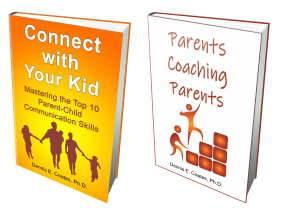It’s often said that experience is the best teacher and that the value of mistakes is that you can learn from them.
There’s a lot of wisdom in this. It’s why we don’t want to protect our kids from every mistake and failure while they’re growing up. If an activity doesn’t put them in harm’s way, they can learn valuable life lessons from whatever happens.
But the lessons won’t automatically flash into their brain, just because something happens to them. To understand why something happened, they have to reflect on the experience. And of course they won’t always do this. Your child could easily go from situation to situation without giving it much thought and without learning a thing.
You can help. When your child makes a mess of things, instead of getting mad, criticizing, or lecturing, ask these four open-ended questions to help them think about what happened:
- What happened? Who did what? What was the sequence of events? The details of an event need to be recalled in order to make sense of them.
- Why did it happen that way? Cause and effect? What were your motives? What helped or hindered? Things don’t just happen. They happen for a reason. To imagine a better way to handle a situation like this, your child needs to understand why things happened the way they did.
- What were the consequences? Outcomes? Benefits? Costs? Problems? Resolutions? Your child needs to appreciate the impact of what happened in order to want to handle it differently in the future.
- How would you handle a similar situation in the future? What did you learn? What basic principles? How are you going to apply this lesson in your life?
You need to get good at spotting a “learning moment”—when something significant has happened to your child. When you sense excitement, agitation, anger or depression, this is your hint to take a few moments to ask the questions that will help them learn from their experience. The exchange should take the form of a discussion, not a lecture. Let your child do most of the talking. The key is to encourage your child to give the answers. Even if the insight is perfectly clear to you, you want to make sure your child discovers the lesson. Fire up your empathy, and when you ask a question, phrase it in your own words. Then listen to understand what your child is telling you. Consider this exchange:
Dad – “What’s wrong?”
Son – “Nothing.”
Dad – “You slammed the front door just now.”
Son – “So I’m sorry already!”
Dad – “You seem upset about something.”
Son – “I’m not upset.”
Dad – “Tell me what happened.”
Son – “It’s no big deal. Just Jerry being a jerk.”
Dad – “What did he do?”
Son – “I lent him my book on fly fishing and when I asked him to return it he said he already gave it back. But he didn’t.”
Dad – “So why do you think he said he gave it back?”
Son – “I don’t know. Maybe he just wants to keep it. He’s had it for almost a year and never returned it. Now I want it back.”
Dad – “That’s a long time.”
Son – “Yeah.”
Dad – “How can you get him to return it?”
Son – “I don’t see how. He says he doesn’t have it anymore. Maybe he forgot where it came from and gave it to somebody else. I don’t know.”
Dad – “Frustrating.”
Son – “It makes me mad.”
Dad – “I can imagine.”
Son – “It was my favorite fishing book. Grandpa gave it to me. I thought I could trust Jerry with it.”
Dad – “I’m sorry it didn’t work out. How can you keep something like this from happening again?”
Son – “I’m done letting Jerry borrow my books. He can get his own books from now on.”
Dad – “Is this how you want to handle it?”
Son – “Maybe I shouldn’t be lending any of my books.”
Dad – “They’re important to you, aren’t they?”
Son – “This one was special. Some of the others I don’t care about.”
Dad – “So you’re saying maybe you won’t give out the books that matter.”
Son – “Maybe.”
Dad – “Do you think this will work for you?”
Son – “People might think I’m stingy. But they’re my books. I don’t have to let people borrow them.”
Dad – “Okay.”
Son – “And maybe I’ll get another copy of the fly fishing book.”
Dad – “Sounds like a great idea.”
Kids can also learn from success. If they pause to think about it, they can get a handle on what worked, so they can repeat the success in the future. Using the four questions, you can help them do this. And if you do it often enough, your child can make a habit of pondering the questions without you.
Helping a child learn from experience is the topic of Chapter 6 in my how-to book: Connect with Your Kid: Mastering the Top 10 Parent-Child Communication Skills.
 This book, along with Parents Coaching Parents, will help you make change happen.
This book, along with Parents Coaching Parents, will help you make change happen.
You can grow the bond with your child through better listening. Download the FREE ebook, Listening to Understand.

